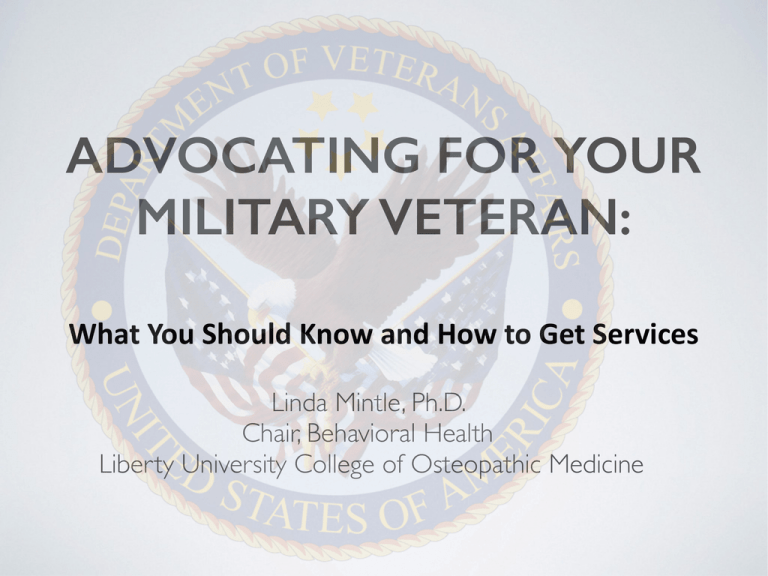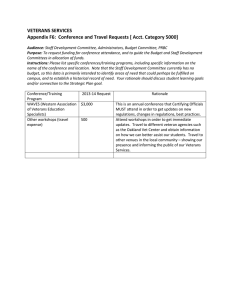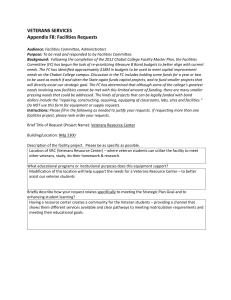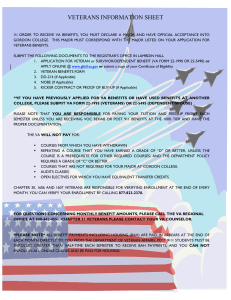Document 14711977
advertisement

ADVOCATING FOR YOUR MILITARY VETERAN: What You Should Know and How to Get Services Linda Mintle, Ph.D. Chair, Behavioral Health Liberty University College of Osteopathic Medicine WHY SHOULD WE ADVOCATE? • George Washington • “The willingness with which our young people are likely to serve in any war, no matter how justified, shall be directly proportional to how they perceive the veterans of earlier wars were treated and appreciated by their nation.” TODAY’S VETERANS • Volunteers, self-selected • More educated than the typical American • Physically and mentally healthier than population at large • Record levels of Reserve and National Guard forces (older and more educated than active duty) TODAY’S VETERANS • Conflicts characterized by chronic, low-tomoderate levels of violence vs dramatic, high intensity battles of the past. • Civilians mixed in with combatants and no front lines. THUS… • More exposure to civilian suffering • Less sure of adversaries • Both lead to more psychological effects STATS • 45% of Iraq and Afghanistan veterans are currently seeking compensation for service-connected disabilities, and about one-third of all new veterans are being granted some level of disability benefits. MOST COMMON • Tinnitus, or ringing in the ears • The second most prevalent is partial hearing loss • Other common conditions include afflictions like arthritis and lower-back strain. PTSD • Must experience some level of social or occupational impairment (the most serious disability rating, of 100%, is reserved for total occupational and social impairment, persistent delusions, and symptoms of comparable severity) US DEPARTMENT OF VETERAN AFFAIRS BENEFITS • Disability compensation • Pension • Education • Home loans • Life insurance MORE BENEFITS • Vocational rehabilitation • Survivors' benefits • Medical benefits • Burial benefits. VA HEALTH BENEFITS http://www.va.gov/opa/persona/index.asp • Inpatient hospital care • Outpatient services to promote, preserve, or restore health • Traditional hospital services-surgery, critical care, orthopedics, pharmacy, radiology, and physical therapy • Mental health-e.g., Bereavement Counseling, etc. • Programs-e.g., Healthy living, quit smoking, etc. • Groups-Homeless, rural veterans, women, combat vets and families, etc. FOCUS ON 2 MAIN BENEFITS • Compensation: Benefit paid on the basis of the kind and severity of a disability that happened as a result of the veteran’s active duty in military service. • Pension: Benefit paid on the basis of a disability that was not a result of active service in the military, or because of age. Pension is also based on income. GET STARTED • Enroll in the VA Benefits • Obtain an E Benefits account and apply for your claims on-line YOU WILL NEED • Discharge or separation papers • Dependency records • Private medical records • Service treatment records and supporting statements THEN… • Get all the information together and make a copy for yourself • Submit it all at once in what is called a Fully Developed Claim • Track the status of the claim on eBenefits.va.gov CLAIMS • Go to a Claims staff at a VA processing center • Rated in increments of 10% from 0% to 100% • Benefit awarded—usually within 9 months ! PENSION • 65 or older, or permanently and totally disabled • Served on active duty with at least one day during a period of war • Income and net worth don’t exceed certain limitations • Special: Due to a mental or physical disability that requires assistance of another person COMPENSATION • Benefits due if veteran has a disability that is the result of an injury, disease, or an event in military service. • Needs to be at least 10% disabling. FRUSTRATING: SERVICE-CONNECTED COMPENSATION • Wait 6 months before receiving a decision from a VA Regional Office (VARO) • If denied, the appeal process can take another 6 months to 2 years at local level and then is forwarded to next level in DC • Then 2 years for decision by the Board of Veteran Affairs • If denied, can take 10 or more years waiting for another decision WHY? • VA laws and regulations are complex, convoluted and under constant change. • Easy to overlook a piece of needed information. • Forms are confusing. WHAT HELPS? • Vets represented by attorneys have the lowest denial rate. • Veterans who are represented by claim agents have an even higher success rate. WHAT IS ADVOCACY? • Basic communication skills • Listening to what other people have to say • Talking about what the veteran needs that is important 3 TYPES OF ADVOCACY • Self-advocacy: Understand and communicate your own needs to others. The veteran tries to navigate the system on his/her own. • Individual advocacy: Speaking out on behalf of the veteran. Family members can do this. • Systems advocacy: Attempting to change policy, government, rules, regulations, etc. COMMUNITY ADVOCACY • Share your experiences with others. • EX: Work with the local chapter of the Brain Injury Association of America, Wounded Warrior Project • Raise awareness for specific issues like TBI WHEN TO ADVOCATE • Problems or concerns with the veterans care; identify what you think the vet needs • Be specific: Talk to the health team directly. Doctors make rounds early am so may be best time to reach them or the team. • Be firm, but cooperative • No response, keep asking STRATEGIES • Not getting results: Contact the Ombudsman or Patient Advocate at the service facility • Bring questions when attending care conferences • Take notes during meetings for the vet • Explain your concerns but do not tell the worker how to do their jobs MORE STRATEGIES • Be kind and build a relationship with the health care workers. • Work cooperatively, they don’t always know the need. • Give workers reasons why your loved one needs great care. Tell stories so they get to know the veteran well. KEEP UP WITH CHANGES • December 2014: Expanded eligibility for Veterans in need of mental health care due to sexual assault or sexual harassment that occur during military service (military sexual trauma— MST) • Now includes Reservists and National Guard members participating in weekend drill • Don’t need a service-connected disability or compensation or be enrolled in VA’s health care system for treatment. PATIENT ADVOCACY PROGRAM • For all veterans and their families who receive care at the Veterans Health Administration (VHA) facilities and clinics. • Treatment team: Doctor, nurse, social worker, dietitian, pharmacist, chaplain, therapist and other professionals • Contact a PA if your concerns are not being addressed by your treatment team TIPS • Be proactive; Don’t wait for feedback • Research and know the laws, e.g., Americans with Disabilities Act, the Uniformed Services Employment and Reemployment Rights Act. Family Medical Leave Act. MORE TIPS • Seek out resources • Be familiar with the signs and symptoms of PTSD and TBI (1/3 of the military population is working through challenges related to stress, depression and head injury) • About Face: Resource from National Center on PTSD MORE TIPS • Write to Congress people • Know where to find the resources you need. • Keep a log of people, places resources and share with others. RESOURCES • National Organization of Veterans’ Advocates, Inc. (NOVA) • The Patient Advocacy Program • National Coalition for Homeless Veterans • National Veterans Legal Services Program • Veterans Benefits Center-The American Legion • Disabled American Vets (DAV) SUM • The work is time consuming, complicated and laborious, but in the end you can really help a veteran by getting the benefits needed.



